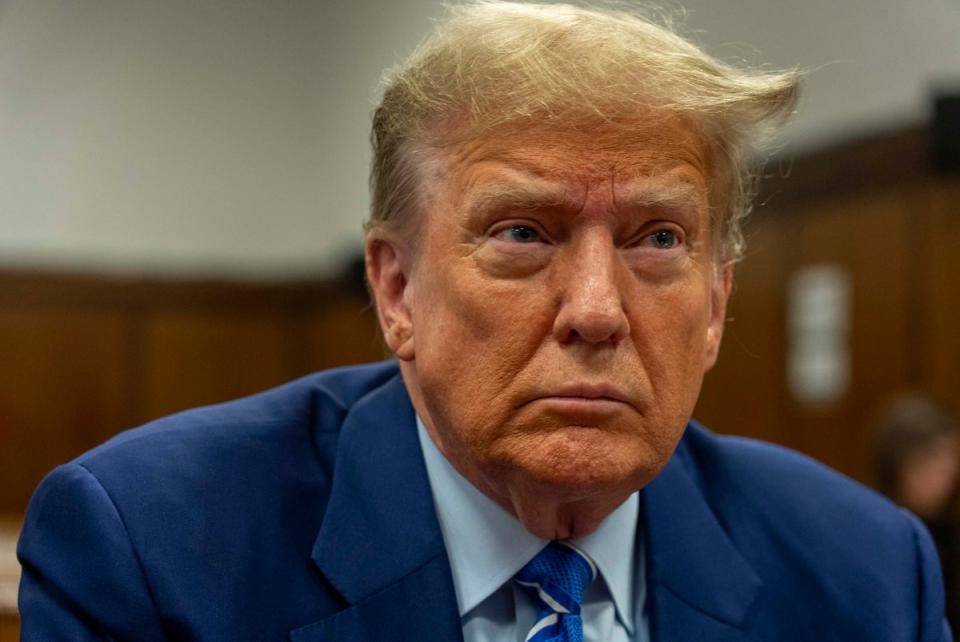A dog dad, a best man and a workaholic: The New Yorkers too busy for Trump’s trial
New Yorkers’ busy lives are under the microscope in Donald Trump’s hush-money case, as potential jurors have been bringing up their jobs, their political views, their busy schedules and even their dogs during jury selection in the Manhattan courtroom.
On Tuesday morning, the second day of the first-ever criminal trial of a sitting or former US president got under way and apparently, unlike day one, Mr Trump managed to stay awake.
So far, no jurors have been picked to decide the former president’s fate as he faces 34 counts of falsifying business records in connection to a so-called hush-money scheme involving payments to cover up an alleged affair the then presidential candidate had ahead of the 2016 election. He has pleaded not guilty to the charges.
Like Mr Trump, who has grumbled that he would rather be attending his son Barron’s graduation instead of sitting in the courtroom, potential jurors have also cited scheduling conflicts and other places to be for why sitting on the six-to-eight-week-long trial could be an issue.
To date, potential jurors have only been excused after citing an inability to remain impartial – which has happened quite a bit – and scheduling conflicts.
Here’s what some of the prospective jurors said:
Among the diverse pool of jurors, one commonality appears to be that New Yorkers are simply too busy to attend the high-profile trial.
No one has explicitly said they don’t want to be there but, through answering questions, they have provided glimpses into their busy lives, from looking after their dogs to weddings to attend... and being workaholics.
One man, an investment banker, was excused after saying he was going to be best man in a wedding in June. He said the trial would likely prove to be a “strain” on his work and personal life.
Several potential jurors have also mentioned their dogs. One man, a Mexican who became a US citizen in 2017, said: “I don’t live with anyone else, except my dog.”

For others, it was their families.
One potential juror, a Puerto Rican who has lived in the Lower East Side for 40 years, emphasised his commitment to his family. He divulged that he has been married “a long time” and has one child and two grandchildren. “I have no spare time … I guess my hobby is my family,” he said.
Some of the questions in the prospective jury questionnaire pertained to employment, asking whether they, a relative, or a close friend had ever worked in accounting, finance or law.
One juror admitted she dated a lawyer once and “it ended... fine,” sparking laughter in the courtroom. She worked in cybersecurity, she said, and feared missing work. Having told the court she was concerned she wouldn’t be present enough for the trial, she was excused.
Her profile seems to align with that of Kara McGee, who told CNN after being excused that she worked in the cybersecurity industry. She told the outlet that she believed she was dismissed after voicing “the nature of my job would make it very difficult for me to be there”.
Beyond demanding work and personal schedules, many potential jurors expressed that they might be unable to remain impartial.
Joshua Steinglass, the assistant district attorney, told the jury box on Tuesday afternoon that they are not trying to “pry into your lives” but only to “pick a jury that will be fair to both sides”.
He laid out the obvious – that the defendant is a former president and a current presidential candidate.
“We don’t expect you to be living under a rock for the last eight years or last 30 years,” he said, before emphasising that “this case is about whether this man broke the law”.
Still, many people voiced an inability to remain impartial in the case.
An Upper East Side resident, who runs a healthcare consulting company, confessed: “I’m not 100 per cent that I can be fair.”
A man also said: “After having more time and thinking about it and reading the questions, I don’t think I can be impartial.” He was excused.
One potential juror told the court that his fraternity brother is a Republican state lawmaker. When asked whether he has “any political, moral, intellectual, or religious beliefs or opinions which might prevent you from following the court’s instructions on the law or which might slant your approach to this case”, he replied in the affirmative.
“Growing up with a bunch of friends and family who are Republicans, it’s probably going to be tough to be impartial,” he said. Judge Juan Merchan told him: “We appreciate your candour.” He was also excused.
